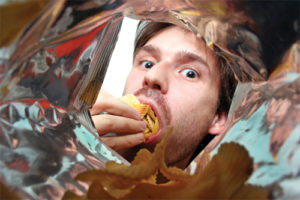
By Malia Frey
You stick to your diet all day and eat healthy well-balanced meals. Then, the evening comes and you find yourself making repeated trips to the refrigerator or pantry to eat food that you don’t really need. Sound familiar? If it does, you’re not alone. Nighttime calories are a struggle for many dieters who find that they continue eating after dinner. If you’re serious about losing weight, use these tips to stop eating so much at night.
Why Do I Eat So Much at Night?
You’re normal if you like to snack and graze after eating dinner. But if you are trying to lose weight, the calories you consume from snacks in the evening could easily undo a day’s worth of smart food choices. So, the first step to eating less is to find out why you eat when you don’t need to.
For most of us, the reason we overeat is related to the fact that we are less busy at night and we are near food. We like to relax and enjoy more leisurely activities, and food is a common source of comfort. Without the distraction of work or other daytime activities, it’s easy to grab for snacks that are nearby. If you can find other ways to unwind, then you’ll be likely to eat less at night. You can also use these strategies to curb nighttime eating.
How to Stop Eating After Dinner
The best way to curb your nighttime eating behavior for good is to use short-term strategies to break the habit.
If you can replace snacking with a healthier habit, then you won’t feel the urge to overeat in the evening. Use one of these tips (or all three) to change your nighttime snack habit.
Move away from the food. You’re more likely to eat too much at night if you are always around food. So, after dinner, move away from the kitchen. This might mean that you postpone clean-up tasks, so that you aren’t tempted to eat leftovers. Or better yet, delegate the job to someone in your house who isn’t on a diet.
Another great way to get away from food is to go for a walk after dinner. Even if your walk is just 15-20 minutes long, physical activity helps to break up the eating momentum. It also gives your body a chance to feel the sensation of fullness, so the urge to eat is less strong.

Use a “meal-ender” to curb your appetite. Some dieters use mint-flavored gum to diminish the desire to eat after dinner. Most of us don’t like the taste of food when we have a mint flavor in our mouths. Brushing your teeth after dinner provides this same benefit — along with a dental health bonus.
You can also try using MealEnders. These small candies claim to “reset” your taste buds so that you don’t feel the urge to eat, and I can attest that they can help to dull post-meal hunger. MealEnders contain no stimulants and are regulated as a food product, so they have to follow strict guidelines of the Food and Drug Administration, unlike many diet and weight loss supplements.
Be a smart television watcher. Most of us eat too much at night when we snack mindlessly in front of the television. Some researchers even believe that certain action shows make us eat too much food. Regardless of your show preference, however, you can create healthy eating habits in front of the television to eat less and lose weight.
My favorite way to eat less is to keep my hands active. I fold laundry or do other simple chores while I watch TV. If I really want to eat — and I know I’ve eaten enough for dinner — then I use specific diet strategies to control snacking in front of the TV. I also make sure that I follow good portion control guidelines if I choose to snack while watching TV.
Remember, snacking isn’t bad for your diet. But eating when you’re not hungry is never a good plan. Learn to eat a healthy dinner and then create habits to stop eating so much at night. You’ll reach your goal weight faster and keep your weight off for good.

Comments are closed